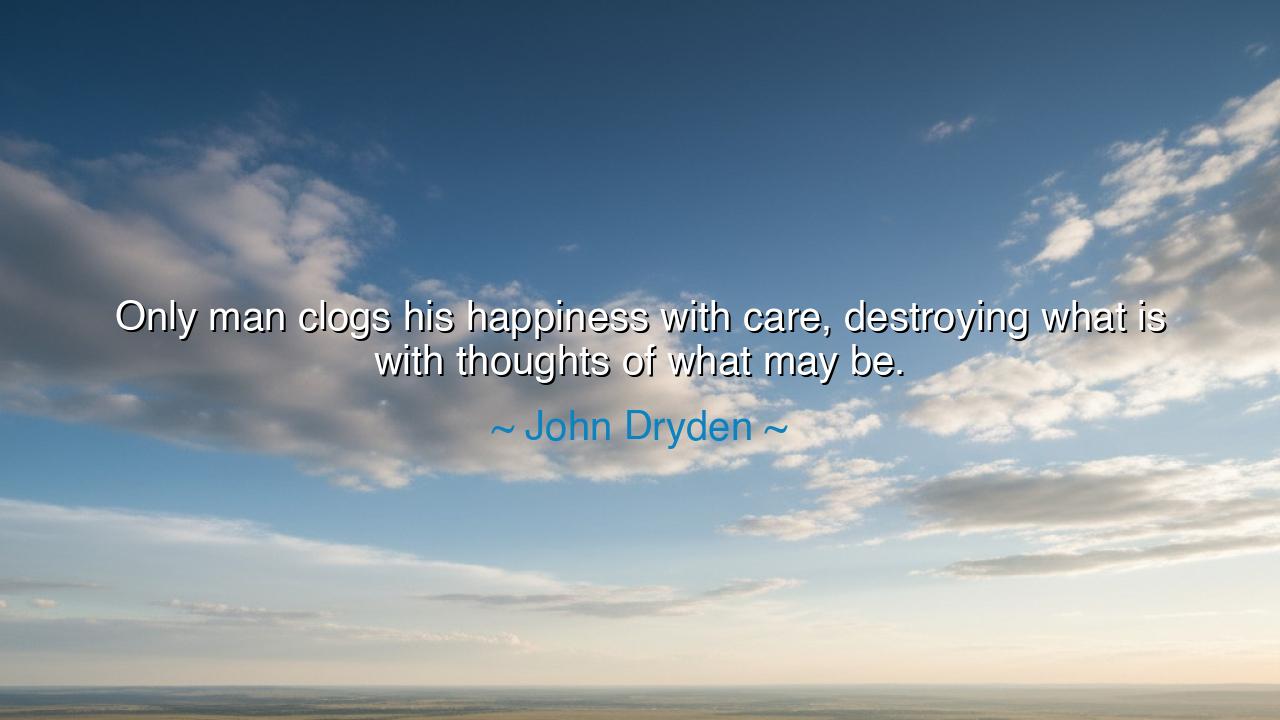
Only man clogs his happiness with care, destroying what is with
Only man clogs his happiness with care, destroying what is with thoughts of what may be.






“Only man clogs his happiness with care, destroying what is with thoughts of what may be.” Thus wrote John Dryden, the great English poet of the seventeenth century, whose words pierce the heart of human folly like a finely honed blade. In this single sentence, he reveals one of the deepest paradoxes of existence: that man, though gifted with reason and imagination, often becomes the prisoner of his own mind. Unlike the beasts of the field, who live in the eternal present, man burdens himself with worry—about tomorrow, about failure, about what might or might not be. In doing so, he destroys the happiness that already surrounds him, trading peace for anxiety, reality for illusion.
Dryden’s insight was born from his own age of turmoil—a time of war, political upheaval, and shifting loyalties. He lived through the English Civil War and the Restoration, witnessing kingdoms fall and rise again. Men of his time feared the uncertainty of the future and clung to the false comfort of speculation and control. Yet Dryden, keen observer of the soul, saw that the greatest enemy of joy was not the world’s instability, but man’s own restless heart. He understood that care—the mind’s ceaseless fretting over what may come—clouds the light of the present. The wise, he implies, must learn to rest in what is, for the moment we let fear of the future overshadow gratitude for today, we lose both.
To “clog happiness with care” is to weigh down the spirit with unnecessary burdens. It is to take the golden hours of life and tarnish them with the rust of worry. The river of joy flows freely through the now, but man dams it with anxious thoughts of the future. We say, “I will be happy when I achieve this,” or “when danger passes,” or “when fortune smiles again.” And in saying so, we postpone happiness indefinitely. The beasts, the birds, the trees—they all live in the eternal rhythm of being. They neither regret the past nor dread the dawn. Only man builds prisons of thought and locks himself within them.
Consider the story of Leo Tolstoy, the great Russian novelist, who after achieving wealth and fame fell into despair. Surrounded by success, he could not rest, haunted by questions of purpose and death. His mind, like Dryden’s warning, “destroyed what was with thoughts of what may be.” But when he turned to the simple peasantry of his homeland, he found in their humble lives a secret he had forgotten: contentment with the present moment. They worked, they sang, they prayed, and they did not trouble themselves with endless “what-ifs.” Through their example, Tolstoy rediscovered the peace that comes when one accepts life as it is—moment by moment, breath by breath.
Dryden’s words remind us that care, when ungoverned, becomes a thief. It steals the sweetness of what we already possess. It blinds us to beauty. How often do we destroy joy by anticipating loss, or poison love by fearing its end? A man sits in his garden beneath the sun, yet his thoughts are already clouded by tomorrow’s storms. In so doing, he forfeits both today’s peace and tomorrow’s strength. Happiness cannot dwell in a heart that is forever elsewhere. It requires presence, the simple courage to live this hour fully, neither mourning yesterday nor fearing the next.
There is, however, wisdom in care when it is balanced by faith. To prepare for the future is prudent; to fear the future is folly. The ancients taught moderation in all things, and so too must we temper foresight with serenity. Let care serve as a tool, not a master. Let reason plan, but let gratitude reign. The man of wisdom acts for tomorrow but lives for today. He understands that life is not a promise of permanence but a gift of moments—fragile, fleeting, and radiant in their imperfection.
Therefore, O seeker of peace, heed the lesson of John Dryden: Do not destroy what is with thoughts of what may be. When you eat, taste. When you work, give yourself wholly to the task. When you love, do not fear its end—rejoice in its presence. The future is a shadow yet unformed; the present is the light in which you stand. To live rightly is to dwell in this light with open hands and an untroubled heart. For the man who can rest in the moment, even for a breath, has found the secret that philosophers and kings have sought for ages—the happiness of being.






AAdministratorAdministrator
Welcome, honored guests. Please leave a comment, we will respond soon